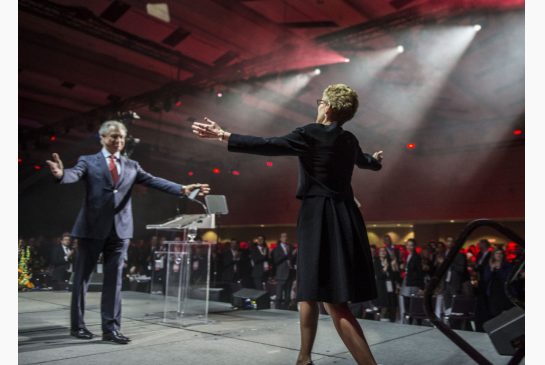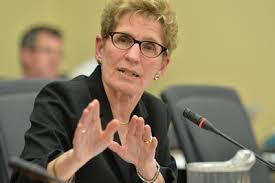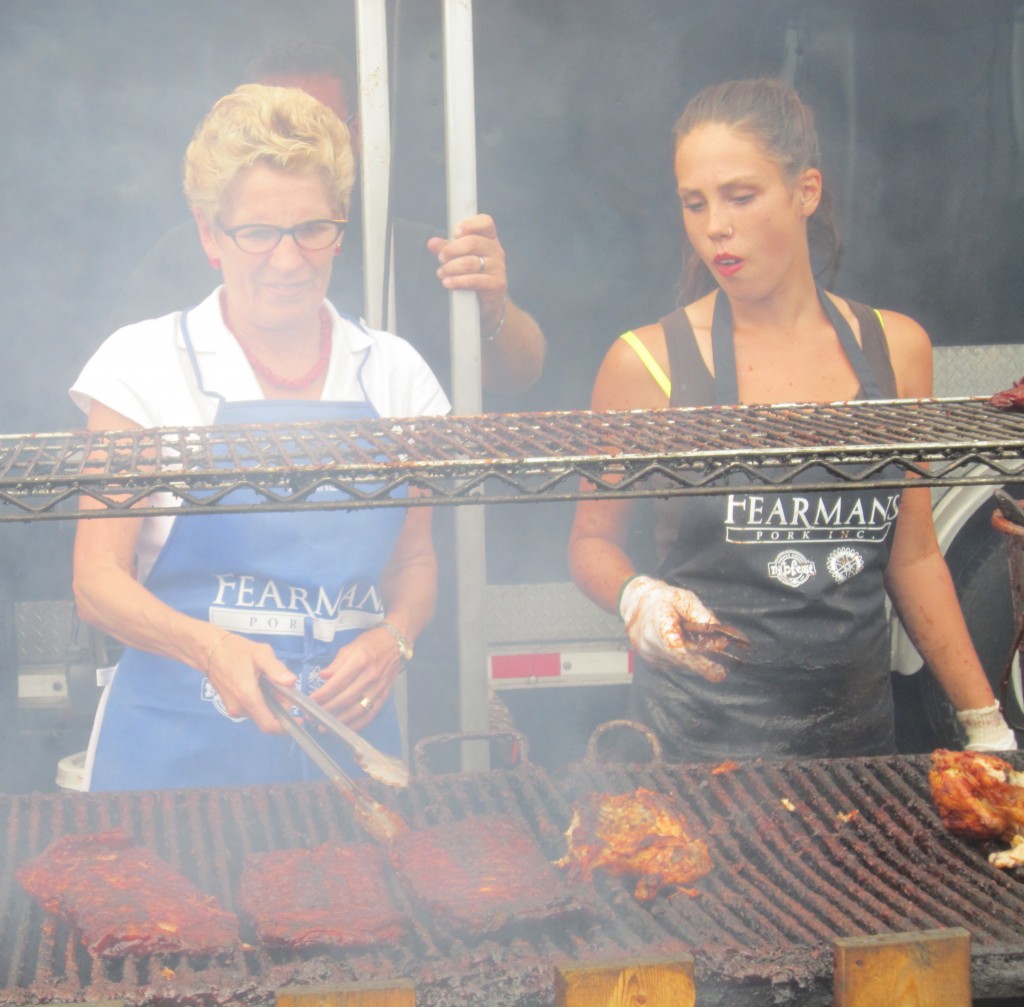 By Staff
By Staff
April 12, 2016
BURLINGTON, ON
The Premier of Ontario Kathleen Wynne released the following statement earlier today.
I have just had a meeting with the Leader of the Green Party of Ontario to discuss election financing reform. I want to thank Mr. Schreiner for a very positive meeting to discuss these much-needed changes. He provided input, advice and feedback on the areas for reform and on the questions I asked of him — the same questions I asked the Leaders of the Official Opposition and NDP yesterday. There was much agreement between me and Mr. Schreiner on the areas for reform.

GypTech president of Gary xxxx escorts Premier Wynne during a RibFest in Burlington.
Mr. Schreiner made some specific requests that I would like to respond to directly. He said he wants to make sure the legislative committee process to consider election financial reform is open, has time to hear from witnesses across the province on the draft legislation, and allows for a full consideration of the draft legislation after both First and Second Reading.
As I said yesterday, I intend to bring forward legislation in May before the Legislature rises on June 9. With the agreement of the Legislature, we would send that legislation to Standing Committee sooner than usual, after First Reading to allow for a first opportunity to make amendments based on public input, before Second Reading. In addition, further legislative committee hearings after Second Reading will allow for another round of input and amendments.
This would allow for consultation immediately, while the Legislature is still sitting, and for further consultation during the summer, across Ontario, in agreed-upon locations. The first government witness invited to appear before the legislative committee hearings would be Ontario’s Chief Electoral Officer. In the meantime, as the legislation is being drafted, we will consult regularly with the Chief Electoral Officer.
The second government witness invited to appear before the legislative committee hearings would be Mr. Schreiner.

Was it the smile that drew these two together? Does he have influence?
In an open letter prior to today’s meeting, Mr. Schreiner asked that “big money” be taken out of politics, and asked the government to bring in comprehensive reforms that include eliminating corporate and union donations prior to the next Ontario general election. The legislation we will introduce this spring will propose a ban on corporate and union donations and I am committed that changes be in place or significantly underway before the June 2018 election.
He has also asked that the government end the practice of “selling access to Ministers of the Crown.” As I said yesterday, political donations do not buy policy decisions. Any suggestion otherwise is completely false. As Premier, I’ve always been clear that decisions made by me and my Cabinet are always made with the best interests of Ontarians in mind.
Ministers need to fundraise, just as all MPPs do, to support their work during campaigns. Ministers can do small group high-value fundraisers with two stipulations:
1. The event is publicly disclosed before it occurs.
2. The Minister is not meeting/fundraising with stakeholders of his/her ministry.
I have made the decision to immediately cancel upcoming private fundraisers that I or Ministers attend.
Future Liberal fundraisers will be made public on the OLP website.

Premier Wynne can be very convincing.
To recap, our government has already undertaken a number of initiatives to make election financing more transparent. In 2007, we introduced third-party advertising rules and real-time disclosure for political donations. Last June, I announced that we would make further changes to the Elections Act. And, as I announced last week, our government plans to introduce legislation on political donations this spring, including measures to transition away from union and corporate donations.
The legislation we will bring forward this spring will include the following:
First — reform of third-party advertising rules, including definitions, anti-collusion measures and penalties. Maximum spending limits on third-party advertising will be severely constrained for election periods and constraints considered for pre-election periods.
Second — a ban on corporate and union donations.
Third — reduction of maximum allowable donations to a figure that is in the range of what is permitted federally for each Party; to all associations, nomination contestants and candidates, as well as leadership campaigns.
Fourth — constraints on loans/loan guarantees to parties and candidates, including leadership candidates
Fifth — reform of by-election donation rules.
Sixth — overall reduction in spending limits by central parties in election periods and introduction of limits between elections.
And seventh — introduction of leadership and nomination campaign spending limits and donation rules.
To reach critical decision points associated with these issues. I have asked the following questions of all three party Leaders.

Premier Wynne has been to Burlington on a number of occasions. She learned how to flip a rack of ribs pretty quickly at RibFest. She also personally recruited current MPP Eleanor McMahon to run as the Liberal candidate in the last provincial election.
• On the issue of third-party advertising, we are proposing a much lower spending limit. What should that limit be? What should the constraints on third-party advertising be between elections? Should there also be an individual contribution limit for those advertising campaigns?
• We are proposing a ban on corporate and union donations, which would begin on January 1, 2017. Should there be a transitional subsidy based on vote counts from the previous election? If so, how long should the transition period be in order to allow all parties to adjust?
• We are proposing a lower limit on donations. Should that limit be phased in over time?
• We are proposing that, during by-elections, that there be no special doubling of donations to the central party. By-election campaigns should be restricted to raising funds only to the allowable limit, both locally and centrally. What are the other Leaders’ thoughts on how we should manage any by-elections that occur before the legislation is in effect?
• We are proposing overall spending limit reductions in the writ period and setting limits between elections. We would like the Leaders’ input on this.
• We are proposing setting spending limits for leadership and nomination campaigns. What should these spending and donation limits be?
The government also intends to bring forward separate legislation this fall to amend the Elections Act, including proposals to:
• Change the fixed election date for the next general election to the spring of 2018
• Allow provisional registration of 16- and 17 year-olds
• Establish a single address authority in Ontario
• Eliminate the first blackout period for all elections, and
• Integrate, simplify and modernize a range of election processes as per the advice of the Chief Electoral Officer.
It is clear that there are flaws in the current legislation, which all parties have been operating under. The reality is that Ontario’s election financing system has not kept up with changes made federally and in some other provinces. The current system also does not meet today’s public expectations. I am determined to make changes that are right for Ontario. And I believe it is important that we now move expeditiously to make these changes.
It is important to get this right. I look forward to hearing further from all three Leaders as they consider the answers to the questions I have asked them, so that we can move quickly to bring about these needed reforms.
Ray Rivers on election funding.
The times they are a changing- the public has gotten to the point where they just plain don’t like the way the politicians climbed into bed with any special interest with a cheque book. The conflict of interest was just too blatant. The tip of that iceberg was identified by the Globe and Mail when they published a series of articles on how the politician raised the money they need to fight elections. The opposition parties didn’t make too much noise over the news reports because they too rely on corporate, union and special interest money.
But the media coverage was a little too strong to ignore – and so now the Premier has set out an aggressive set of changes that everyone is going to get a chance to have their say on. Note though that the Premier made this announcement after meeting with the Green Party – she is avoiding what the NDP and the Conservatives want to do to her neck.
Premier Wynne does deserve credit for getting in front of the parade and not getting trampled by a crowd reaction.














